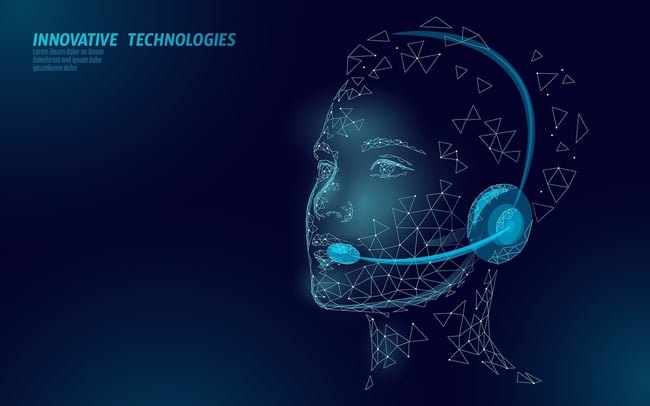
Agentic AI in Call Centers:
A Strategic Guide for Business Leaders
The contact center landscape is experiencing its most significant transformation since the introduction of cloud technology. Agentic AI, autonomous goal-driven artificial intelligence that makes decisions and takes independent action, is reshaping how organizations deliver customer service, optimize operations, and drive business outcomes.
For C-suite leaders, this isn't just another technology trend to monitor. Agentic AI represents a strategic opportunity to fundamentally reimagine customer experience delivery while achieving measurable improvements in efficiency, satisfaction, and competitive positioning.
What Is Agentic AI?
Agentic AI goes far beyond traditional artificial intelligence applications. While conventional AI systems respond to specific inputs with predetermined outputs, agentic AI operates autonomously, making complex decisions, adapting to changing circumstances, and executing multi-step workflows without human intervention.
In contact center environments, this means AI systems that don't just follow scripts but understand context, set goals, develop strategies to achieve those goals, and continuously adapt their approach based on real-time feedback and outcomes. These systems leverage generative AI capabilities while adding layers of reasoning, planning, and autonomous execution that traditional chatbots and automated systems cannot match.
The key differentiator lies in autonomy and decision-making capacity. Agentic AI systems can handle complex, multi-faceted customer interactions that require judgment, creativity, and strategic thinking, capabilities previously reserved for experienced human agents.
Transformative Use Cases in Call Centers
Intelligent Call Routing and Queue Management: Agentic AI analyzes real-time customer data, agent availability, skill sets, and current workload to make optimal routing decisions that maximize first-contact resolution while minimizing wait times. The system continuously learns from outcomes, refining its routing algorithms to improve both customer satisfaction and operational efficiency.
Dynamic Agent Assistance and Personalized Scripting: Rather than providing static scripts, agentic AI generates real-time, personalized guidance for agents based on customer history, emotional state, and interaction context. This enables consistent, high-quality service delivery while empowering agents to handle complex situations with confidence.
Autonomous Customer Service Operations: Advanced agentic systems can independently manage appointment scheduling, service requests, billing inquiries, and technical support issues. They handle multi-step processes, coordinate with backend systems, and make decisions about escalation timing, all while maintaining personalized, context-aware interactions.
Adaptive Training and Performance Optimization: Agentic AI creates personalized training simulations for agents, identifies skill gaps through interaction analysis, and develops customized coaching programs that adapt based on individual learning progress and performance outcomes.
Proactive Quality Assurance and Compliance: These systems continuously monitor interactions for quality standards, regulatory compliance, and customer satisfaction indicators, automatically flagging issues and implementing corrective actions before problems impact customer experience or business risk.
Business Impact: Why the C-Suite Should Pay Attention
Operational Excellence and Scalability: Agentic AI enables contact centers to handle increased volume without proportional staffing increases. By autonomously managing routine interactions and optimizing complex workflows, organizations can scale operations efficiently while maintaining service quality standards.
Enhanced Customer Experience Metrics: Early adopters report significant improvements in key performance indicators. Customer Satisfaction (CSAT) scores increase as interactions become more personalized and efficient, while Net Promoter Scores (NPS) improve through consistent, proactive service delivery that anticipates and addresses customer needs.
Agent Experience and Retention: Rather than replacing human agents, agentic AI transforms their roles from reactive problem-solvers to strategic relationship builders. By handling routine tasks and providing intelligent assistance, these systems reduce cognitive load, increase job satisfaction, and improve retention rates, addressing one of the contact center industry's most persistent challenges.
Strategic Business Intelligence: Agentic AI systems generate deep insights about customer behavior, service trends, and operational performance that inform strategic decision-making across the organization, from product development to marketing strategy.
Implementation Roadmap for Business Leaders
Assessing Organizational Readiness: Success requires evaluating current infrastructure capabilities, data quality and accessibility, existing workflow maturity, and stakeholder alignment around customer experience objectives. Organizations must ensure their technology foundation can support autonomous AI operations while maintaining security and compliance standards.
Strategic Implementation Approach: Begin with targeted pilot projects that demonstrate clear value and minimal risk. Focus on use cases where agentic AI can deliver immediate impact, such as appointment scheduling or basic inquiry resolution, while building internal expertise and stakeholder confidence.
Vendor Selection and Integration: Choose partners with proven experience in contact center environments and demonstrated ability to integrate with existing systems. Prioritize solutions that offer transparency in decision-making processes and provide clear escalation paths for complex situations.
Change Management and Adoption: Successful implementation requires comprehensive change management that addresses both technical and cultural considerations. This includes training programs for agents and supervisors, clear communication about role evolution, and ongoing support to ensure smooth adoption.
Measuring Success: Key Metrics for ROI
Track traditional contact center metrics, CSAT, NPS, first-contact resolution, average handling time, and agent turnover, alongside new indicators specific to agentic AI performance. Monitor automation rates, decision accuracy, escalation frequency, and customer preference for autonomous versus human assistance to optimize system performance and business outcomes.
The Strategic Imperative
Agentic AI in call centers represents more than operational improvement. It's a competitive differentiator that enables organizations to deliver superior customer experiences while optimizing costs and empowering human talent. The organizations that act strategically now will establish significant advantages in customer loyalty, operational efficiency, and market positioning.
The question for business leaders isn't whether agentic AI will transform contact centers, but how quickly they can harness its potential to drive meaningful business outcomes.
Ready to Lead Your Industry with Agentic AI?
The future of customer service is autonomous, intelligent, and more human than ever. At Ascent Business Partners, we help C-suite leaders navigate the complex landscape of agentic AI with our proven, risk-free methodology that ensures every recommendation aligns with your strategic objectives.
Our technology-agnostic approach means you get unbiased guidance on the best agentic AI solutions for your unique operational environment, without traditional consulting fees or long-term commitments.
Schedule Your Strategic Discovery Call – Let's discuss how agentic AI can deliver measurable improvements in customer experience, operational efficiency, and competitive positioning for your organization.

